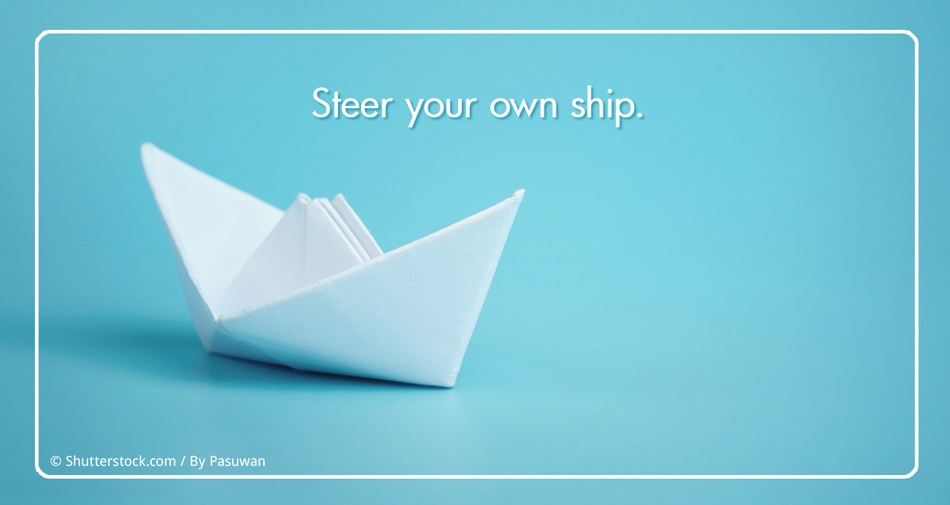
Steer your own ship.
by Darlene Tonelli, November 4, 2019.
This is the last post in our blog series on how the traditional model fosters unhappiness for lawyers.
Certainly, the business model needs to be tweaked. A few key elements of the law firm model could be redesigned relatively easily with a human-centered approach, to the benefit of the profession as a whole. That was covered in the series, and we’re doing it at Inter Alia.
What we haven’t talked about yet is how many lawyers are also part of the problem. Quickly, for those lawyers who are thrilled to be where they are, valued for their work, professionally and personally fulfilled…. great! If you think your career and place in the legal world is good enough, and are happy enough to stay without suffering any personal fallout… good!
But for those who are miserable – and not making a move – this post is for you. This is for all you lawyers who can’t quite figure out where you want to be, or even whether the legal profession is the right place for you. An improved law firm model would help with this but not solve it.
Many of you feel badly. You feel bored by your work. You feel annoyed with the dynamic at your office or the lack of respect afforded to you by your colleagues. But you simultaneously want to advance and be recognized within this system, even if it’s not fulfilling to you. In the American Bar Association’s Pathway to Lawyer Wellbeing Report, this was described as many lawyers feeling “a ‘profound ambivalence’ about their work” (page 7).
I think what you might be ambivalent about is whether the malaise you are experiencing is because of the legal profession, the law firm model, or you. You’re uncertain about whether to give credence to these feelings, or just accept them as a necessary cost of having access to the other parts of the profession that you do like, including the status and financial security it affords.
However, what I believe to be true is that there is a cost to downplaying our own feelings, our own instincts, and our own needs, in pursuit of outside things like status and financial gain. We have to take ownership in ourselves, period. We have to define our values, know who we are, and make choices that are real and in service of the people we actually are, not the people we “should” be.
Once we start owning this en masse, we can start to create workplaces that create product/market fit for lawyers and clients and allow ourselves to knock it out of the park without restriction. If we don’t own it, we’ll expect the fixes to the law firm model to solve the problem, and my take on it is that won’t work. We need to fix the model AND the lawyers.
To do that, we have to get rid of our attachments to the things I write about in this blog – ego, status, ideas about what a lawyer is “supposed to be” or the career you “should have”; money, profit, an edge over other people. Fear of learning new things, fear of change, fear of risk.
As an example of how serious this task is, a personal anecdote may help.
This year several friends of mine have died – most were in their 40’s. One was by suicide, another was an overdose that might have been a suicide. Only one was a lawyer. They all had what society would call pretty good jobs and careers. But my personal observation of them was that all seemed undervalued in their jobs, or unsure of their place in the organization in which they were working. Whether this was actually true doesn’t really matter – it was how they felt, but they did not take steps to find an organization in which they were valued more highly. They seemed to me to have internalized the views of the people who looked at them and thought “meh”, rather than taking a risk on stepping out into the unknown to find the people who thought – “wow! How are you so amazing?” I have no way of knowing whether that state of feeling devalued contributed to their very early deaths, but I think it’s fair to say it didn’t help.
The lesson I take from this, in trying to find some way to help other good people to not find themselves in these bad situations, is to acknowledge that staying in an environment in which you do not feel you are valued, or in which you are not equipped with what you need to do your best value work, is dangerous. It’s no less dangerous than eating a high cholesterol diet, smoking, or doing any other bad behaviour that you know you should improve for your own well-being but you don’t.
Allowing yourself to feel devalued at work is a form of self-endangerment that gets very little mention in our society. And it’s odd to think that in law firms where lawyers are financially well-compensated, they might be devalued. But value is a multifaceted word.
We all have one life. Our biggest resource is time. We have to take the time to figure out how we can feel good as we go through our days. We have to trust that feeling and follow it and know that that feeling will help everything else in our lives. We can’t know where the world will be in 5 years, whether we’ll ever save enough to “retire”, whether we’ll make it to 85, or whether the choices we’re making today will be the “right” ones.
But we know this – we have to steer our own ship, not leave it to someone else to decide our direction and our fate. Whatever that means in your own life, do it. it doesn’t necessarily mean you have to start your own business, or quit your job, but it does mean getting really clear on what personal responsibility and ownership for your outcomes means in your life.
Start with the gifts in your life that you can be grateful for every day. They are different for each person, and some have more than others. Great kids, an awesome spouse, a home, a really excellent community, a talent. Looking at these can help us form a baseline in which we feel good and valued, not just through monetary rewards that may “one day” get us that good feeling, once we have “enough”.
I think our whole profession will change if we start to understand what “enough” means. If we start the morning with “I have enough today”, instead of “today I’m going to get more/I need more”, our perspective will change. And maybe a balanced form of happiness within a demanding career will no longer seem like such a radical concept.
We welcome your input at any time.
Find us on Twitter, LinkedIn and Instagram or listen to us talk more about these ideas on the Lawyer Life Podcast (LLP).

